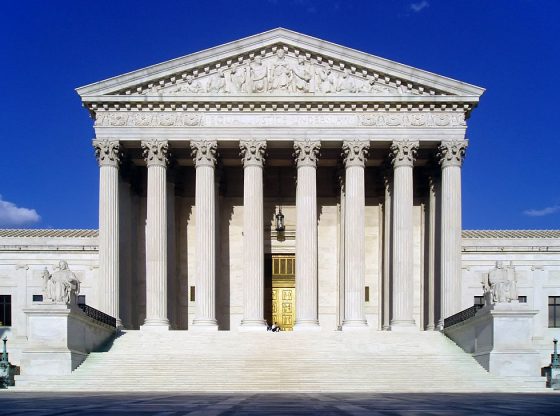The Supreme Court will hear a case Tuesday that could have major implications for hundreds of Jan. 6 defendants — as well as special counsel Jack Smith’s prosecution of former President Donald Trump.
The case, Fischer v. United States, asks the Supreme Court to weigh the scope of an obstruction statute, Section 1512(c)(2), which penalizes anyone who corruptly “obstructs, influences, or impedes any official proceeding” with up to 20 years in prison. Joseph Fischer, who entered the Capitol on Jan. 6, argues that his prosecution under the law for obstructing Congress’ certification of the 2020 election was an “unprecedented expansion” of the statute.
The law, enacted as part of the Corporate Fraud and Accountability Act of 2002, was intended to target evidence tampering, focusing on “deterring fraud and abuse by corporate executives,” Fischer argues.
“Before the January 6 cases, no court had applied Section 1512(c)(2) to conduct not intended to affect the availability or integrity of evidence,” Fischer’s attorneys argued in a brief. “Nor had a defendant ever been convicted of an obstruction-of-Congress offense outside the context of a legislative inquiry or investigation.”
Fischer stated he was in the Capitol for less than four minutes — after Congress had already recessed — and “was not part of the mob that forced the electoral certification to stop.” He was arrested in February 2021 on several charges, including assaulting Capitol police.
Should the Supreme Court agree with Fischer, it could impact not just his case, but hundreds of defendants the Department of Justice (DOJ) charged with a felony under the statute. Over 353 of the nearly 1,387 Jan. 6 defendants have been charged with “corruptly obstructing, influencing, or impeding an official proceeding,” according to the DOJ.
Several defendants have already been granted early release ahead of the ruling, including Kevin Seefried, Alexander Sheppard and Thomas B. Adams Jr., according to The Washington Post.
“It takes four justices to grant certiorari and, although this court will not attempt to read tea leaves, the Supreme Court’s decision to review Fischer means, at a minimum, that this case poses a ‘close question,’” District Court Judge Amit P. Mehta wrote in the January decision granting Adams’ release.
The government argues that the text “is not limited to conduct that affects the integrity or availability of evidence.”
“Instead, Congress adopted a traditional catchall clause, reaching all forms of corrupt obstruction of an official proceeding,” it said in a brief.
The D.C. Circuit Court of Appeals favored the government’s interpretation 2-1 in an April 2023 ruling, finding that the “meaning of the statute is unambiguous.”
“Under the most natural reading of the statute, §1512(c)(2) applies to all forms of corrupt obstruction of an official proceeding,” Judge Florence Pan, a Biden appointee, wrote in the majority opinion.
But Judge Gregory Katsas, a Trump appointee, wrote that the government’s interpretation was “mistaken,” making it “implausibly broad and unconstitutional in a significant number of applications.”
“Among other things, that construction would sweep in advocacy, lobbying, and protest—common mechanisms by which citizens attempt to influence official proceedings,” he wrote. “Historically, these activities did not constitute obstruction unless they directly impinged on a proceeding’s truth-seeking function through acts such as bribing a decisionmaker or falsifying evidence presented to it.”
“The government’s reading is also hard to reconcile with the structure and history of section 1512, and with decades of precedent applying section 1512(c) only to acts that affect the integrity or availability of evidence,” he wrote.
Republican Arkansas Sen. Tom Cotton, House Judiciary Committee Chair Rep. Jim Jordan and 21 other members of Congress wrote in an amicus brief filed with the Supreme Court that the lower court’s ruling “will only reward and incentivize politically motivated uses of ill-fitting criminal statutes with harsh penalties.”
Just when you thought Jack Smith’s J6 case against Donald Trump couldn’t get any more laughable–it just did.
In one week, SCOTUS will hear arguments on DOJ’s (ab)use of 1512c2, post Enron document shredding “obstruction of an official proceeding” statute passed in 2002.
My… pic.twitter.com/1MNLAWSHnp
— Julie Kelly 🇺🇸 (@julie_kelly2) April 9, 2024
While the Supreme Court will weigh Trump’s bid to dismiss his election interference case based on presidential immunity in April, the Fischer case could also jeopardize part of the indictment.
Two of Trump’s charges in his election interference case are centered on the obstruction statute. Smith’s indictment allegesTrump used “knowingly false claims of election fraud to obstruct the federal government function by which those results are collected, counted, and certified.”
New York University law professor Richard A. Epstein wrote for the Hoover Institution in March that a correct reading of the statute “torpedoes a key part of the Smith indictment.”
“Trump never entered the Capitol building, and he never made any statement urging rioters to enter the building,” he wrote. “His despicable conduct consisted of watching the proceedings before asking the rioters and trespassers to leave the premises, which does not count as obstruction under any legal authority of which I am aware.”
Smith addressed this in the footnote of his brief filed this week in Trump’s election interference, claiming the charges would still be valid regardless of the Supreme Court’s decision on how to read the text of Section 1512(c)(2). He wrote that the “use of falsehoods or creation of ‘false’ documents satisfies an evidence-impairment interpretation.”
Trump’s case is currently on hold at the district court pending the justices’ decision. Oral arguments will be held April 25 to consider Trump’s presidential immunity argument.












